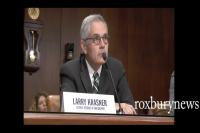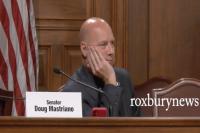As released by The Department of Justice.
United States Attorney Peter J. Smith
Middle District of Pennsylvania
HARRISBURG - The United States Attorney’s Office for the Middle District of Pennsylvania announced today that a Harrisburg man was indicted by a federal grand jury in Harrisburg on charges of committing 14 bank robberies in 4 central Pennsylvania counties from November 2014 through February 2015.
According to United States Attorney Peter Smith, Andre Mosley, age 47, was charged with robbing 14 financial institutions in Dauphin, Cumberland, Franklin and York Counties from late 2014 through February of 2015. The total amount taken is estimated at approximately $52,000. The institutions were:
Members 1st Federal Credit Union,
Harrisburg Fulton Banks, two Harrisburg branches
Mid-Penn Bank, two Harrisburg branches
M&T Bank, Harrisburg
Patriot Federal Credit Union, Chambersburg
PNC Bank, Carlisle
Members 1st Federal Credit Union, Carlisle
Citizens Bank, Highspire
Fulton Bank, Hummelstown
Santander Bank, Red Lion
Northwest Savings Bank, York
The case was investigated by the Harrisburg Office of the Federal Bureau of Investigation’s Violent Crimes Task Force, the Harrisburg Police Department, the Pennsylvania State Police and local and municipal police departments in the communities where the financial institutions were located. Prosecution of the case has been assigned to Assistant United States Attorney William A. Behe.
Indictments are only allegations. All persons charged are presumed to be innocent unless and until found guilty in court.
A sentence following a finding of guilt is imposed by the Judge after consideration of the applicable federal sentencing statutes and the Federal Sentencing Guidelines.
The maximum penalty under federal law is 20 years of imprisonment on each count, a term of supervised release following imprisonment, and a fine. Under the Federal Sentencing Guidelines, the Judge is also required to consider and weigh a number of factors, including the nature, circumstances and seriousness of the offense; the history and characteristics of the defendant; and the need to punish the defendant, protect the public and provide for the defendant's educational, vocational and medical needs. For these reasons, the statutory maximum penalty for the offense is not an accurate indicator of the potential sentence for a specific defendant.
Photo/Natalie Cake file.


































